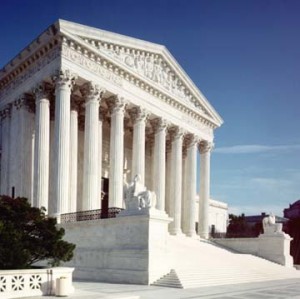
"To block the sale would force the liquidation of Chrysler, a step whose economic consequences would be so severe that two national governments have committed unprecedented resources to prevent it. Granting applicants that form of relief would be manifestly contrary to the public interest."
Using her emergency powers, Supreme Court Justice Ruth Bader Ginsburg put Chrysler’s sale to Fiat on temporarily hold this afternoon just before 4 pm, while the court considers a request by the State of Indiana to review the case and ultimately block the sale.
Late last Friday, the U.S. Court of Appeals for the Second Circuit in New York City said the sale of Chrysler to Fiat SpA could proceed this Monday afternoon unless the Supreme Court intervened by 4 pm.
Chrysler could be losing as much as a $100 million a day as the bankruptcy drags on.
The Supreme Court now has the option to consider the case, and nothing can happen “pending further order” of the Court. The U.S. Supreme Court rarely hears emergency appeals, such as the one coming from Indiana.
A three-judge appeals panel for the Second Circuit dismissed arguments against the Fiat sale from the State of Indiana Friday afternoon, which holds a tiny portion of less than 1% of Chrysler’s debt. This led to today’s request by Indiana that the Supreme Court overturn two lower Federal Courts.
In a brief filed this morning for Ginsburg, the U.S. Solicitor General for the Department of Justice, Elena Kagan, defended the Fiat sale, claiming that creditors would get $2 billion in cash, or 29 cents per dollar of debt, compared with only $800 million in a liquidation that will occur if the Fiat sale falls through. Fiat has given a deadline of June 15th for the transaction to occur, otherwise it will withdraw its offer.

"The bankruptcy court applied settled law," said Kagan.
The Justice Department brief said that Indiana’s challenge to the bankruptcy court’s approval of the sale “rests on the premise that the facts of this case are not as the bankruptcy court found them. The bankruptcy court applied settled law to the trial record, and the court of appeals’ affirmance of that decision does not conflict with any decision of this Court or another court of appeals. There is accordingly no basis for further review or for an interim stay.”
The Solicitor General’s brief was consistent with the original decision of Bankruptcy Judge Arthur Gonzales, who maintained that the sale was the best way to preserve the assets of Chrysler LLC while ensuring its survival, and paying off creditors to the maximum degree possible.
At stake is whether Fiat will get the assets related to the research, design, manufacturing, production, assembly and distribution of passenger cars, trucks and other vehicles, including prototypes, under brand names that include Chrysler, Jeep and Dodge. The New Chrysler Group will be largely free of previous obligations, allowing it in theory to make a profit at current depressed sales levels. No other company was interested in buying Chrysler during a court supervised sale procedure.
The Solicitor General concluded: “Here, only two outcomes are possible. Either the sale will go forward, in which case New Chrysler will be able to restart the production lines — or Chrysler will be liquidated. As the bankruptcy court specifically found, no other options are available. Applicants’ (Indiana’s) bid to block the sale would force the liquidation of Chrysler, a step whose economic consequences would be so severe that two national governments have committed unprecedented resources to prevent it. Granting applicants that form of relief would be manifestly contrary to the public interest.”
